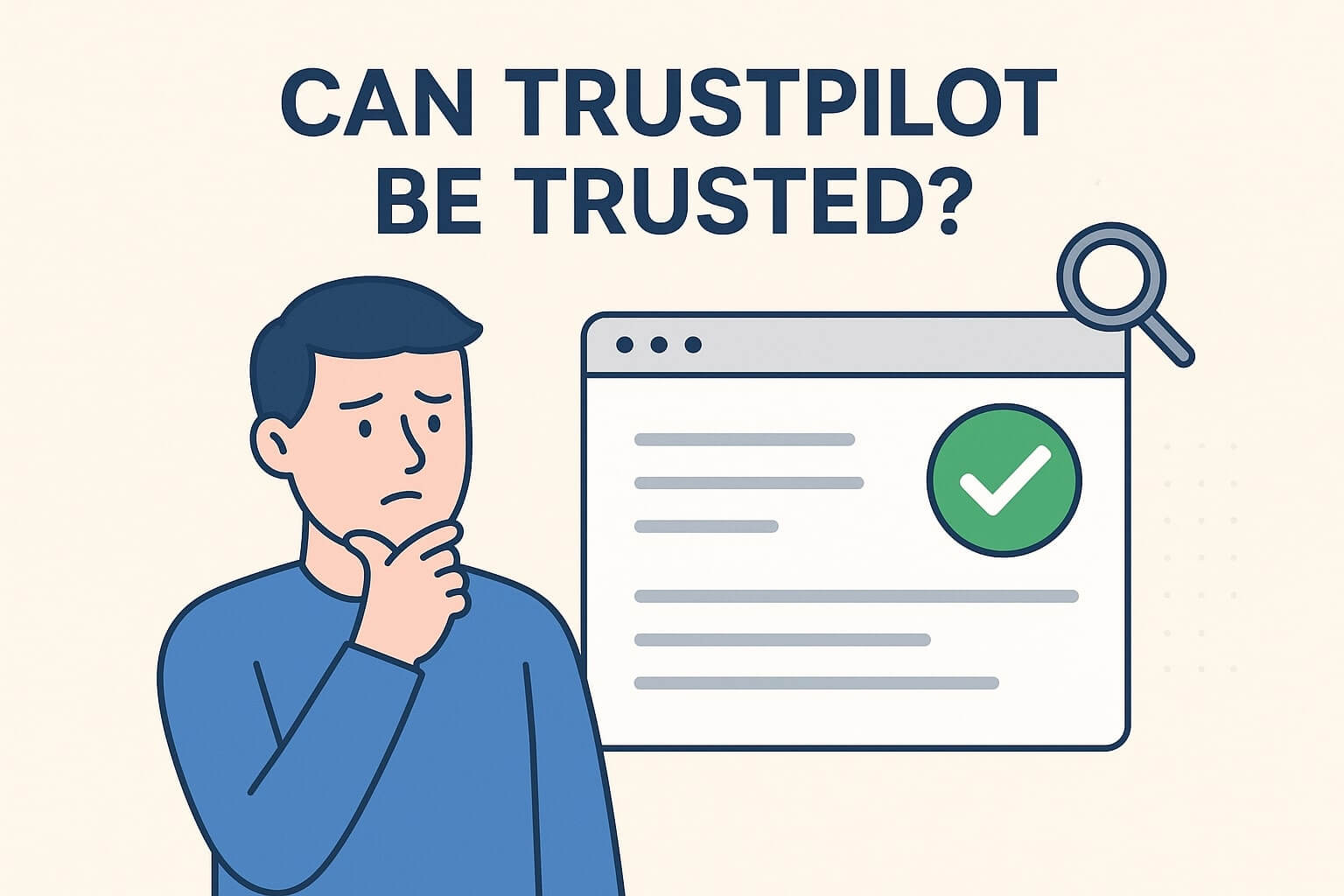Online reviews are one of the most powerful influences on consumer decisions in 2025. But with this power comes responsibility—and controversy. Platforms like Trustpilot have become household names, but more and more people are asking: Can Trustpilot actually be trusted?
In this post, we’ll explore how Trustpilot operates, the reliance on the public to create company listings, the potential conflicts of interest with their monetization strategy, and what this means for both businesses and consumers.
🌍 How Trustpilot Works
At first glance, Trustpilot appears to be a simple, consumer-first review site. Anyone can search for a company, leave a review, and browse other people’s experiences. But here’s something many don’t realize:
- Trustpilot relies heavily on the public to create company profiles.
- When someone writes the first review for a business not already in their database, Trustpilot automatically generates a listing page for that company.
- This listing then becomes publicly visible, even if the business has no idea it exists.
On the surface, this sounds empowering—customers can hold businesses accountable. But it also opens the door for surprise listings, where companies suddenly find themselves reviewed on a platform they didn’t sign up for.
🏢 What Happens Next: Contacting Companies
Once a company has been reviewed, Trustpilot often reaches out to the business. The pitch? Sign up for a paid plan to manage and display reviews properly.
This means the creation of a business profile is driven by consumers—but the monetization is driven by the businesses themselves. In other words:
- Consumers add companies without consent.
- Trustpilot uses these listings to market to businesses.
- Paid plans unlock features like displaying reviews on websites, analytics, and (some say) more favorable treatment.
This dual approach—free for consumers, monetized for businesses—raises questions about who Trustpilot really serves.
🤔 The Question of Fairness
Some critics argue that businesses who don’t pay for Trustpilot are at a disadvantage. For example:
- Negative reviews may sit on a company’s profile without much recourse.
- Paying companies appear to get more support in disputing or removing certain reviews.
Now, to be clear, Trustpilot denies favoritism—but the perception persists. And in the world of online reputation, perception often matters as much as reality.
⚖️ The “Legal Action” Narrative
When Trustpilot’s legitimacy is questioned, they often point to their legal battle against fake review sellers. In fact, they highlight a well-publicized case where they successfully sued a company for selling fake reviews.
On paper, this looks like a victory for transparency and trust. But ask yourself:
- Was this a one-off case used as a PR move?
- How often do they actively pursue fake review sellers?
- Or was it more about marketing themselves as defenders of honesty?
By championing this legal win, Trustpilot presents itself as a guardian of truth. Yet critics say this narrative might serve more as brand protection than day-to-day policy.
🔍 Can a Paid Review Platform Be Neutral?
Here’s the heart of the issue: Can a platform that monetizes companies also remain impartial in moderating reviews?
When businesses pay for services, it naturally raises doubts:
- Will negative reviews be removed faster for paying clients?
- Are free users treated differently from subscribers?
- Does Trustpilot risk prioritizing profits over transparency?
Even if Trustpilot maintains strict policies, the business model itself leaves room for skepticism. And skepticism erodes trust.
🛠️ Why Transparency Matters More Than Ever
At Rated Stores, we believe transparency should be at the core of every review platform. Unlike traditional approaches, our focus is on making sure reviews stay visible—good or bad—so that customers can make informed decisions.
This means:
- Companies cannot “buy away” negative feedback.
- Reviewers retain their voice without fear of deletion.
- Businesses are encouraged to improve, not hide.
👉 Related: Why Transparency Matters
🚀 What Consumers Should Do
If you’re a consumer navigating Trustpilot reviews, here are a few tips:
- Look for patterns, not single reviews – A flood of overly positive reviews might indicate company-driven campaigns.
- Check dates – Suspicious clusters of reviews in a short period may suggest manipulation.
- Compare across platforms – See if reviews on Google, Rated Stores, and others align.
📈 What Businesses Should Do
If you’re a business worried about Trustpilot listings popping up:
- Monitor review platforms regularly – Don’t wait for surprises.
- Engage with customers directly – Encourage feedback on platforms you trust.
- Focus on transparency – It’s better to embrace honest reviews than chase perfect ratings.
👉 Related: The Ultimate Guide to Reputation Management in 2025
📝 Final Thoughts
So—can Trustpilot be trusted?
The answer depends on how you view their business model. Trustpilot provides value by giving customers a voice. But its reliance on public submissions to generate business leads, coupled with paid plans for companies, raises serious questions about neutrality.
For consumers, it’s a reminder to stay critical and look beyond one platform. For businesses, it highlights the importance of embracing transparency instead of fearing negative reviews.
And for platforms like Rated Stores, it’s a call to set a new standard: where transparency, fairness, and trust come first.
